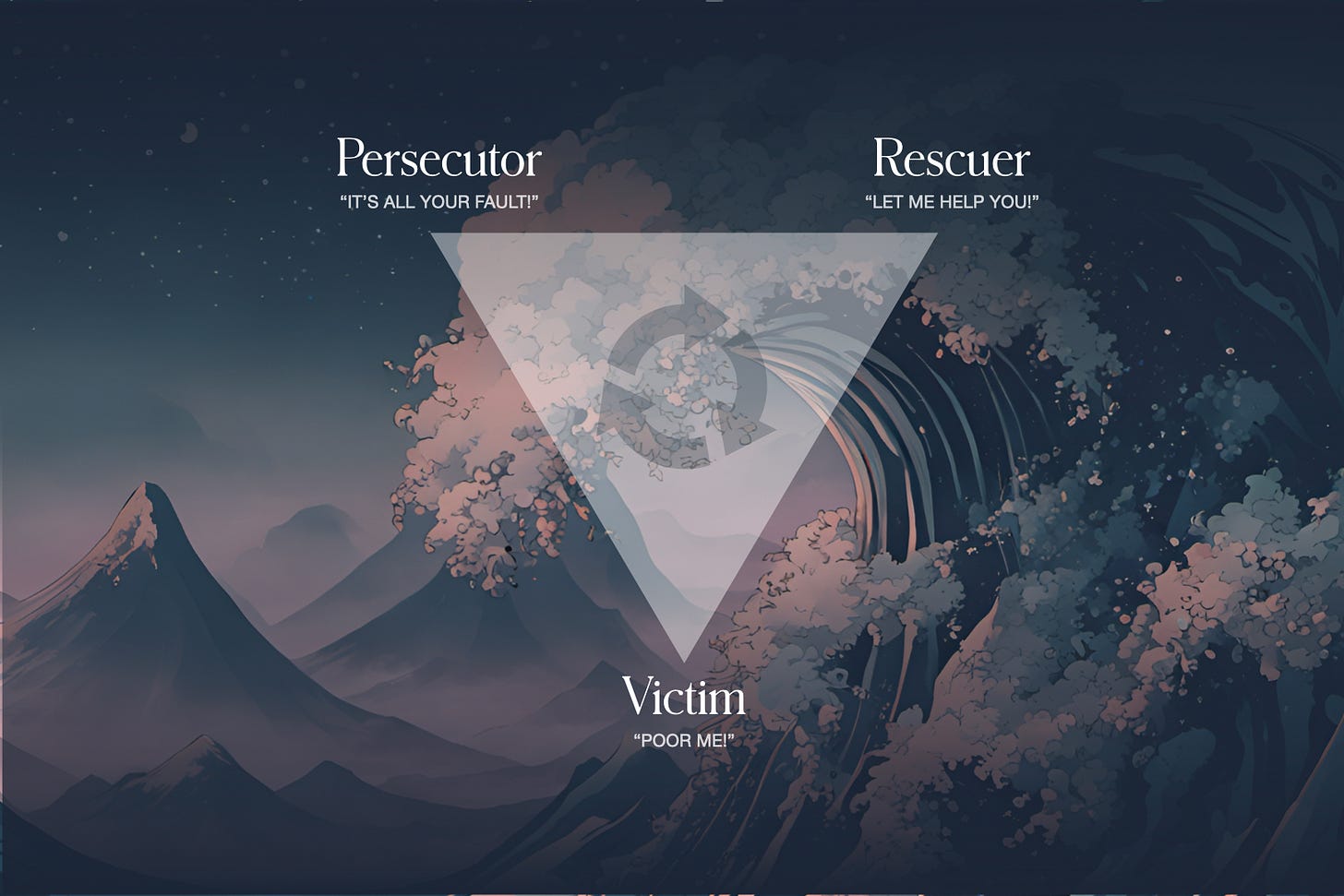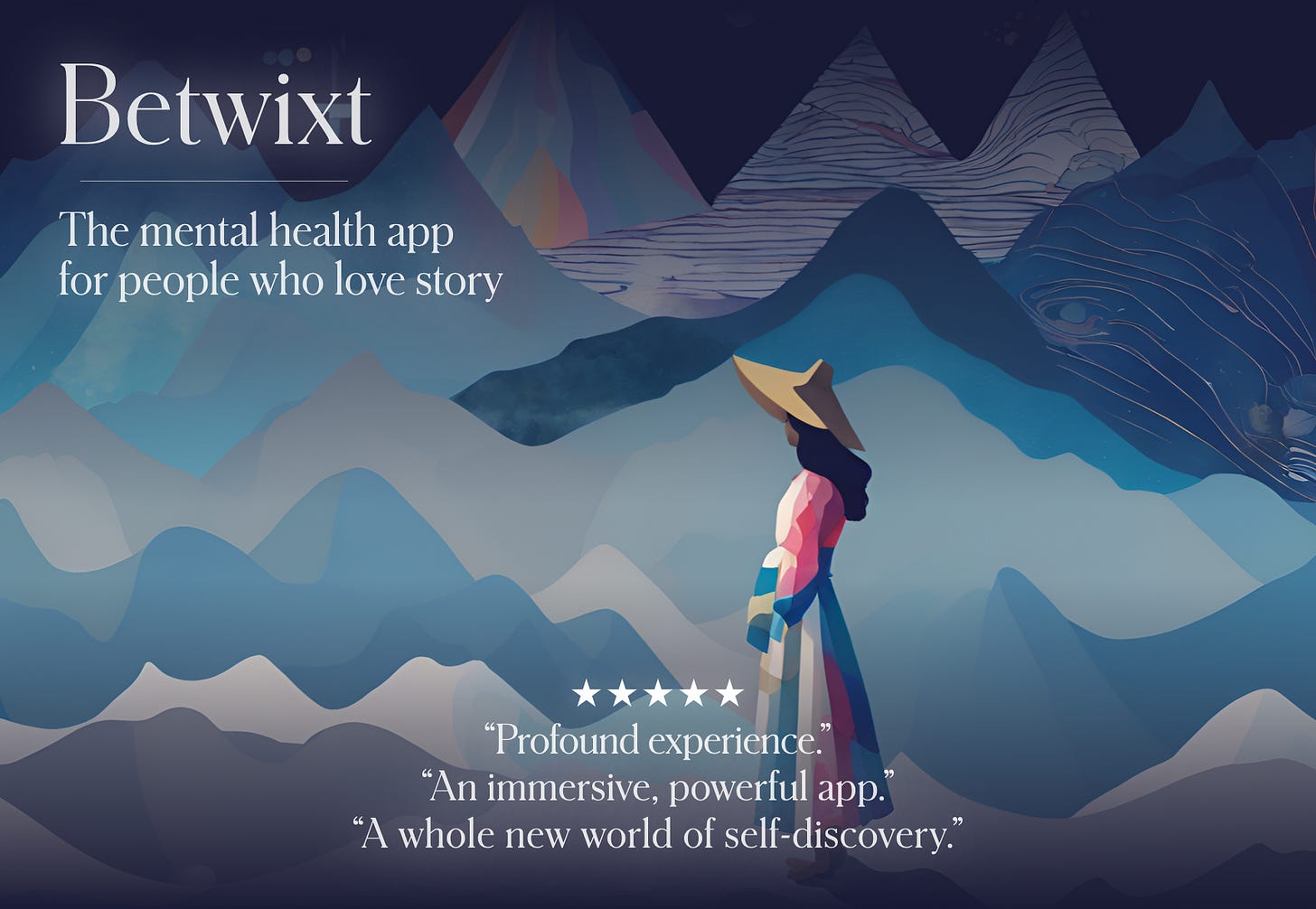How to escape the Drama Triangle: Part II
The Persecuter, Rescuer and Victim in each of us
This post is also available across two TikTok videos (here’s the first one and the second one), and two Instagram videos (first one and second one).
***
In Part I, I introduced the Drama Triangle and the three roles that we play as part of it – the Persecuter, the Rescuer and the Victim. No matter what role we start out with, each of us will likely cycle through all three in a doomed attempt to get others to meet their needs.
Let's take a closer look at how this works.
Attempted needs fulfilment – Persecutor style
Let's get back to the main game of Drama Triangle because we haven't looked at the Persecutor's needs yet. Though it doesn’t seem like it, the Persecutor is trying to achieve the exact same thing as the Victim and Rescuer; they just do it in a more outwardly aggressive way.
This is the case even while the Persecutor is rescuing, which they tend to do in a way that's secretly intended as a form of punishment. They might blame the Victim for being too demanding and then offer intentionally unhelpful or complicated help to ‘get them back’ for the inconvenience. They could be the type of person to give backhanded compliments or do the task requested of them poorly on purpose or with overt grudgingness.
They'll also play the role of Victim in an aggressive way, throwing around accusations like ‘This is all your fault. You're doing this to me’. And they'll do this in an attempt to fulfil the need for power and control, as well as a weird kind of security in their relationships. Because if you disempower the people around you enough, you'll minimise the threat of them standing up and walking away.
The victimhood whirlpool
Now that you have a fuller picture, let's go back to the story about little George from Part I and the incomplete homework, so you can see how the roles are being played. Then we're going to discuss how to get off the dreaded drama triangle.
The angry parent who calls George lazy and good-for-nothing, of course, has stepped onto the Drama Triangle in the role of Persecutor. The other parent jumps in as Rescuer: ‘Leave George alone. They've been trying hard, but they're just not quite getting it!’ In saying this, the Rescuer may feel like they are the one saving their child from the torment of the angry parent, but they are also inadvertently compounding George's sense of inadequacy and giving them an excuse not to do the thing that would actually advance them (the homework).
Simultaneously, the Rescuer is persecuting their partner by undermining them, and therefore forcing both partner and child into the one-down role of Victim. When George runs over to stand with the ‘good-cop’ parent, that signals their move into the position of one-down Rescuer. Here they can keep the rescuing parent in the game by appealing to their hero-ego (‘You’re the only one who’s ever nice to me. Only you can save me.’). Then, in order to climb back out of their ‘bad-parent’ shame, the original Persecutor may turn on the original Rescuer by blaming George’s inadequacy on the Rescuer’s lack of discipline, which would put the original Rescuer into the position of Victim... And hence the whirlpool metaphor: around and around and down and down they all go. At the end of the argument, all parties are left feeling as though they can’t do anything right and that everyone else is out to get them.
This switching of roles, by the way, is a defining characteristic of a psychological game. Moving abruptly from one role to another wins control by causing confusion and disorientation. The other person was perfectly comfortable playing whatever role they were playing and so they get blindsided by the switch, and in that moment the switcher could move into the one-up position.
But any sense of power is short-lived, because the Drama Triangle has this toxic ability to trigger shame as it reinforces painful self-doubts and fears. In this example, both parents get shamed for being bad parents, and George gets shamed for being lazy and stupid.
Opting out of drama
So, the Drama Triangle is never a good place to be. Let's talk about how to escape its trap.
There are three very important but also very predictable and yawn-inspiring words that form the path off the Drama Triangle. Those words are: awareness, honesty, and responsibility.
By awareness, I mean awareness of this game and how and where you play it. Be honest with yourself: which role is your usual starting position? And what's the hook for you? What are the triggers that get you jumping right into that role? The point here is to start to notice the Drama Triangle as it shows up in your life, because that’s the first and most important step.
By honesty, I mean both with yourself and others. You need to be really honest with yourself about the role you're playing in any one drama, and also about the needs you're trying to meet through the game. Once you have this information, the next challenge is to start being more honest with others about those needs. This makes sense: seeing as the Drama Triangle is all about covert, manipulative ways of getting our needs met, then breaking free must be the opposite of that. Put simply, the better you get at talking about your thoughts, feelings and needs, the less drama you'll have in your life.
By responsibility, I mean recognising and really owning the fact that you are the only person who can get yourself out of drama. It's never up to anyone else. The reason this is such an important point is that the refusal to take responsibility is the one thing that links all three roles on the triangle:
The Persecutor refuses responsibility for their own wellbeing because of their belief that it's not their fault (and that therefore somebody else should have to make it right).
The Rescuer refuses to take responsibility for their own wellbeing because of their belief that they have to put others first (lest they feel useless, worthless and powerless).
And the Victim refuses to take responsibility because they just don't believe they can.
The reality is that it's only once you've decided to take 100% responsibility to resolve the drama that it ever will.
Thank you for reading!
We’re Hazel (ex boxer, therapist and author) and Ellie (ex psychology science writer). We left our jobs to build an interactive narrative app for self-awareness and emotion regulation (Betwixt), which you can try on Android here and on iOS here.






The first thing I thought of was of the way governments, charities, and health care "systems" tend to position neurodivergent people as pitiful victims and themselves as saviours when in fact they're often perpetrating or perpetuating the harm by the systems they built and maintain.
I learned a lot from your YouTube video on this! 🫶
It makes my brain and heart hurt to think about this triangle! Thanks for the great info.